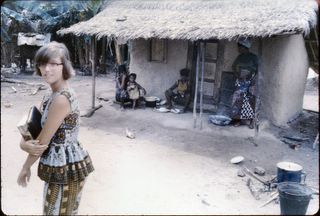Obama's Edge in Foreign Affairs
Fareed Zakaria acknowledges what an edge Sen. Obama's upbringing gives him in foreign affairs. It's something that I know is true from my own upbringing overseas in Liberia.I never thought I'd be in this position. There's a debate taking place about what matters most when making judgments about foreign policy—experience and expertise on the one hand, or personal identity on the other. And I find myself coming down on the side of identity.
Throughout the campaign, Barack Obama and Hillary Clinton have been squabbling over who has the better qualifications to lead the world's only superpower.
[...]
Obama's argument is about more than identity. He was intelligent and prescient about the costs of the Iraq War. But he says that his judgment was formed by his experience as a boy with a Kenyan father—and later an Indonesian stepfather—who spent four years growing up in Indonesia, and who lived in the multicultural swirl of Hawaii.
I never thought I'd agree with Obama. I've spent my life acquiring formal expertise on foreign policy. I've got fancy degrees, have run research projects, taught in colleges and graduate schools, edited a foreign-affairs journal, advised politicians and businessmen, written columns and cover stories, and traveled hundreds of thousands of miles all over the world. I've never thought of my identity as any kind of qualification. I've never written an article that contains the phrase "As an Indian-American ..." or "As a person of color ..."
But when I think about what is truly distinctive about the way I look at the world, about the advantage that I may have over others in understanding foreign affairs, it is that I know what it means not to be an American. I know intimately the attraction, the repulsion, the hopes, the disappointments that the other 95 percent of humanity feels when thinking about this country. I know it because for a good part of my life, I wasn't an American. I was the outsider, growing up 8,000 miles away from the centers of power, being shaped by forces over which my country had no control.
When I hear confident claims about liberty and democracy in the Third World, I always think about rural India, where I spent a great deal of time when I was young, and wonder what those peasants struggling to survive would make of the abstractions of the American Enterprise Institute. When I read commentators fulminating about women wearing the burqa—which I don't much like either—I think about one of my aunts, who has always worn one, and of the many complex reasons she keeps it on, none of which involves approval of misogyny or support for suicide bombers. When I talk to people in a foreign country, no matter how strange, they are always, at some level, familiar to me.
[...]
We're moving into a very new world, one in which countries from Brazil to South Africa to India and China are getting richer, stronger and prouder. For America to thrive, we will have to develop a much deeper, richer, more intuitive understanding of them and their peoples. There are many ways to attain this, but certainly being able to feel it in your bones is one powerful way. Trust me on this. As a Ph.D. in international relations, I know what I'm talking about.
H/T to Andrew Sullivan and Brad Delong



0 Comments:
Post a Comment
<< Home